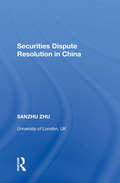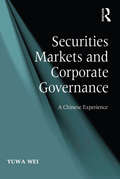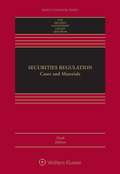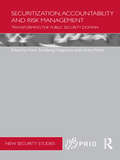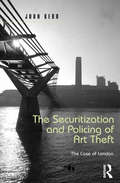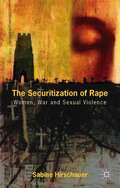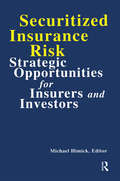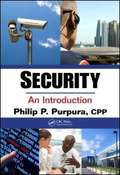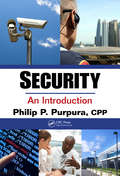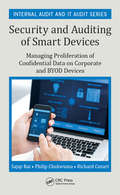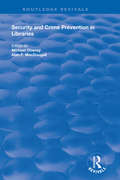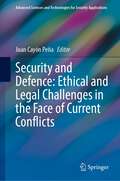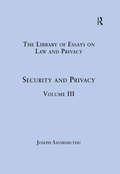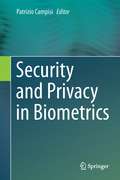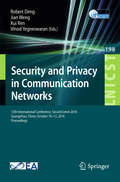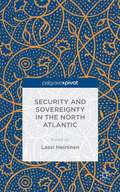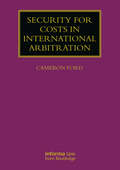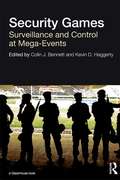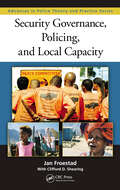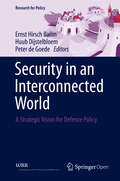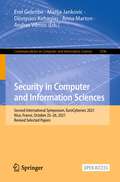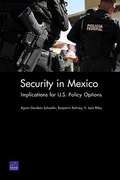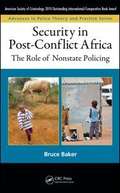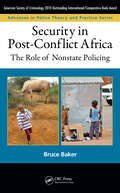- Table View
- List View
Securing Rights for Victims
by Robert C. Davis Julie Whitman James M. Anderson Susan HowleyThis book discusses how some clinics have won significant gains at the appellate and federal court levels concerning victim standing, the rights to be consulted and heard, and the right to privacy. Some have won significant victories in gaining standing for victims and expanding the definition of particular rights. Others are enjoined in the battle. But all have raised awareness of victims' rights in the justice system.
Securities Dispute Resolution in China
by Sanzhu ZhuSecurities Dispute Resolution in China is a comprehensive and detailed study of the increasingly important issue of how cases involving securities are dealt with by Chinese courts, commissions and other administrative authorities and by arbitration and mediation in the PRC. The work identifies the nature and types of securities disputes and the various procedures, including alternative dispute resolution, used to address them. This timely, groundbreaking book is particularly relevant at a time of growing foreign investment in China's securities market. The volume will be an invaluable resource for researchers and practitioners in developed as well as emerging markets.
Securities Markets and Corporate Governance: A Chinese Experience
by Yuwa WeiThis book explores the rationalities and functions of securities markets and takeover activities. Focusing on the Chinese experience of utilizing the securities market as an effective mechanism of corporate control, this volume analyses the future development of China's financial market in the era of economic globalization. Providing an overview of the historical development of the securities market and a literature review of the economic functions of stock markets, Securities Markets and Corporate Governance also examines the legal regimes governing securities markets and takeovers in some leading corporate economies including the US, Germany, Japan and the UK. This volume then focuses on the Chinese experience, proposing a model which balances internal corporate governance and external market control for China.
Securities Regulation: Cases and Materials (Aspen Casebook Series)
by James D. Cox Robert W. Hillman Donald C. Langevoort Ann M. Lipton William K. SjostromThis book contains a very teachable mix of problems, cases, and textual material, encouraging students to build their knowledge base by being active problem-solvers. Always forward-thinking, stressing current developments and controversies, the book is also highly modular, so that professors can easily pick and choose how to structure their courses without being locked into any given progression. New to the Ninth Edition: Coverage of “cryptocurrencies” and coin offerings, Commentary on market developments such as indexing and algorithmic trading, A tighter set of problems and materials on gun-jumping under Section 5, The SEC’s latest reforms of Regulation D and the intrastate offering exemption, Spotify and the trend toward direct listings as a way of going public, Coverage of Supreme Court decisions from the last three years, including Lorenzo, Salman, Cyan, Lucia, and Kokesh, as well as important lower court cases, The SEC broker-dealer proposal (and perhaps adoption) of Regulation Best Interest. Professors and students will benefit from: The book’s highly modular organization, enabling different teaching formats and coverage, Concise notes that introduce the reader to both theory and real-life practice issues. "Securities Regulation casebook for law students"- Provided by publisher.
Securitization, Accountability and Risk Management: Transforming the Public Security Domain (PRIO New Security Studies)
by Ulrika Mörth Karin Svedberg HelgessonThis edited volume examines the reconstitution of the public security domain since the 9/11 attacks, focusing on the banking sector and anti-money laundering (AML) activity in particular. Since the inception of the ‘Financial Action Taskforce’ (FATF) in 1989, AML has been viewed as a global problem. This text argues that the securitization of the financial sector as a result of AML has entailed the emergence of a new public security domain, which transcends the classic public-private divide. The analysis in the volume is multidisciplinary and combines concepts and theories from the literature on securitization, the public-private divide, and business/management. The authors argue that the state is under transformation and that the developments in the security field are part of an ongoing renegotiation of the relationship between the state and the business sector. Securitization, Accountability and Risk Management therefore contributes to a deeper understanding of how the power relationships have changed between the public and the private sectors after 9/11. This interdisciplinary book will be of much interest to students of critical security, risk management, business studies, critical legal studies and IR in general.
The Securitization and Policing of Art Theft: The Case of London
by John KerrThe subject of many films and books, art theft is a fascinating topic that continues to capture the popular imagination. However, it is one of many types of art crime that remain under-researched and which require much more academic, empirical investigation. This book examines who is performing, managing, governing and controlling the securitization and policing of art theft in London. Through giving the first map of the policing and securitization of one of the world’s largest centres of art, it helps our understanding of art security at city, national and international levels and offers practical recommendations for those who operate within art security. Providing the first clear single account of the London art security terrain, this book also advances current knowledge of policing, environmental criminology and insurance. Moreover, it adds to the previous research into the traditionally restricted worlds of private policing, public policing and the art world.
The Securitization of Rape
by Sabine HirschauerThis book uniquely applies securitization theory to the mass sexual violence atrocities committed during the Bosnia war and the Rwandan genocide. Examining the inherent links between rape, war and global security, Hirschauer analyses the complexities of conflict related sexual violence.
Securitized Insurance Risk: Strategic Opportunities for Insurers and Investors (Glenlake Business Monographs)
by Michael HimickSecuritized Insurance Risk is one of the first books to focus exclusively on the convergence of the insurance and financial markets in risk management and the emergence of insurance risk as a non-correlated asset class. Written for insurers and investors alike, this book explores the opportunities available to forward-looking risk and investment managers. Chapters by prominent experts specifically address: the win-win principle behind securitizing insurance risk; current structures, including catastrophe bonds, structured notes, catastrophe options, and swaps; partnering financial market tools with traditional reinsurance programs; holding insurance risk, uncorrelated with stocks and bonds; pricing insurance risk instruments and evaluating basic risk; and regulatory and accounting concerns.
Security: An Introduction
by Philip P. PurpuraToday, threats to the security of an organization can come from a variety of sources ― from outside espionage to disgruntled employees and internet risks to utility failure. Reflecting the diverse and specialized nature of the security industry, Security: An Introduction provides an up-to-date treatment of a topic that has become increasingly complex as more vulnerabilities arise. <p><p> Philip P. Purpura, recently selected by Security Magazine as one of the Top 25 Most Influential People in the Security Industry, shares his 30-plus years of professional experience in the industry to provide basic theory and real-world methodologies that security practitioners can apply to scenarios they encounter. <p> Utilizing real-world examples, each chapter begins with learning objectives and a list of key terms and ends with discussion questions, role-playing exercises, and links to relevant websites. The book offers readers a foundation for understanding and implementing best practices for security to more effectively protect people, assets, and organizations.
Security: An Introduction
by Philip P. PurpuraToday, threats to the security of an organization can come from a variety of sources- from outside espionage to disgruntled employees and internet risks to utility failure. Reflecting the diverse and specialized nature of the security industry, Security: An Introduction provides an up-to-date treatment of a topic that has become increasingly comple
Security and Auditing of Smart Devices: Managing Proliferation of Confidential Data on Corporate and BYOD Devices (Security, Audit and Leadership Series)
by Sajay Rai Philip Chukwuma Richard CozartMost organizations have been caught off-guard with the proliferation of smart devices. The IT organization was comfortable supporting the Blackberry due to its ease of implementation and maintenance. But the use of Android and iOS smart devices have created a maintenance nightmare not only for the IT organization but for the IT auditors as well. This book will serve as a guide to IT and Audit professionals on how to manage, secure and audit smart device. It provides guidance on the handling of corporate devices and the Bring Your Own Devices (BYOD) smart devices.
Security and Crime Prevention in Libraries (Routledge Revivals)
by Michael Chaney Alan F. MacDougallFirst published in 1992, the purpose of this book is to identify and describe the most important factors that must be considered in making decisions about the optimal ways to provide access to information – in short the best way to use the humans, the machines, and the intangible resources known as information, particularly at the organizational level. In recent years executives have begun to outsource computing and telecommunications functions primarily to control costs. Traditional libraries and information centres have been disbanded in favour of service contracts or outright leasing of staff. Both the private and public sector are examining their information service operations from the point of view of cost effectiveness. Decisions about owning versus leasing of information are being made daily. Decision makers are finding that they must deal differently with funding and budgeting of information systems and libraries than they have in the past. New paradigms for these service functions already exist. Not only have corporations and governments begun to contract out entire information service operations, but libraries themselves have begun to consider the costs, effectiveness, and implications of outsourcing some of their operations and services. This book provides a framework for decision-makers to view and review information services within their organizations. Entire units, components of libraries and information centres are defined and untangled so that the widest variety of organizations can analyse their own environments. Although there is a minimal use of library and computing jargon, a short glossary at the end explains terms for which there is no simple English language substitute. Each chapter is accompanied by comments from a broad range of experts in the information field.
Security and Defence: Ethical and Legal Challenges in the Face of Current Conflicts (Advanced Sciences and Technologies for Security Applications)
by Juan Cayón PeñaThis book aspires to face the challenge of analyzing with due academic rigor, always in the paradigm of security and advanced sciences, but without forgetting the ethical questions that our world raises every day. The work is divided into two main sections: the first section is focused on the cyber world, with not only technical but also legal derivations given the expansion of vulnerabilities and our technological dependence. The second section, with a more interdisciplinary nature, runs through undeniably topical issues such as territorial problems and the potential decline of the traditional States, the communicational impact of information management and false news, or the commitment to essential freedoms for the West. This book connects advanced technologies and ethical issues and includes discussions on recent crises such as COVID-19. It also provides an interdisciplinary view on the ethical issues for security technologies.
Security and Privacy: Volume III (The Library of Essays on Law and Privacy #3)
by Joseph SavirimuthuDuring the last decade in particular the levels of critical engagement with the challenges posed for privacy by the new technologies have been on the rise. Many scholars have continued to explore the big themes in a manner which typifies the complex interplay between privacy, identity, security and surveillance. This level of engagement is both welcome and timely, particularly in a climate of growing public mistrust of State surveillance activities and business predisposition to monetize information relating to the online activities of users. This volume is informed by the range of discussions currently conducted at scholarly and policy levels. The essays illustrate the value of viewing privacy concerns not only in terms of the means by which information is communicated but also in terms of the political processes that are inevitably engaged and the institutional, regulatory and cultural contexts within which meanings regarding identity and security are constituted.
Security and Privacy in Biometrics
by Patrizio CampisiThis important text/reference presents the latest secure and privacy-compliant techniques in automatic human recognition. Featuring viewpoints from an international selection of experts in the field, the comprehensive coverage spans both theory and practical implementations, taking into consideration all ethical and legal issues. Topics and features: presents a unique focus on novel approaches and new architectures for unimodal and multimodal template protection; examines signal processing techniques in the encrypted domain, security and privacy leakage assessment, and aspects of standardization; describes real-world applications, from face and fingerprint-based user recognition, to biometrics-based electronic documents, and biometric systems employing smart cards; reviews the ethical implications of the ubiquity of biometrics in everyday life, and its impact on human dignity; provides guidance on best practices for the processing of biometric data within a legal framework.
Security and Privacy in Communication Networks
by Robert Deng Jian Weng Kui Ren Vinod YegneswaranThisvolume constitutes the thoroughly refereed post-conference proceedings of the11th International Conference on Security and Privacy in CommunicationNetworks, SecureComm 2015, held in Dallas, TX, USA, in October 2015. The 29 regular and 10 poster papers presented were carefullyreviewed and selected from 107 submissions. It also presents 9 papers acceptedof the workshop on Applications and Techniques in Cyber Security, ATCS 2015. The papers are grouped in the following topics: mobile, system,and software security; cloud security; privacy and side channels; Web andnetwork security; crypto, protocol, and model.
Security and Sovereignty in the North Atlantic
by Lassi HeininenThe North Atlantic continues to be an area of international strategic significance regionally and globally. This study explores the strong processes of sovereignty, as well as new independent states and micro-proto-states that are forming in the region.
Security for Costs in International Arbitration (Lloyd's Arbitration Law Library)
by Cameron FordThis is the first and leading comprehensive guide to security for costs in international arbitration, including commercial and investment arbitration, providing a text which will be the key resource for those considering, making and ruling on applications for security for costs. It is the first and only work to consider the 40+ factors informing the discretion to award security for costs.The author begins with an introduction and description of the security of costs controversy in international arbitration, and then explains the developing approach of arbitral tribunals to applications for security for costs, with reference to decisions published by ICC and ASA, and statistics of LCIA and decisions of the UK courts when they had the power to grant security for costs in international arbitration. The book features an analysis of the reasons given for restricting security for costs in international commercial arbitration to ‘exceptional circumstances’ or similar. The author conveys discretionary factors taken into account by the courts and arbitral tribunals in considering applications for security for costs, special considerations for investor-state arbitrations, the correct approach to the exercise of the discretion, the manner of making and resisting applications, appropriate orders to be made on applications, and consequences of orders.This book is written for all arbitration practitioners around the world, including arbitrators ruling on applications. The work would be incidentally useful to litigation practitioners as it necessarily considers applications for security for costs in litigation.
Security Games: Surveillance and Control at Mega-Events
by Kevin D. Haggerty Colin J. BennettSecurity Games: Surveillance and Control at Mega-Events addresses the impact of mega-events – such as the Olympic Games and the World Cup – on wider practices of security and surveillance. "Mega-Events" pose peculiar and extensive security challenges. The overwhelming imperative is that "nothing should go wrong." There are, however, an almost infinite number of things that can "go wrong"; producing the perceived need for pre-emptive risk assessments, and an expanding range of security measures, including extensive forms and levels of surveillance. These measures are delivered by a "security/industrial complex" consisting of powerful transnational corporate, governmental and military actors, eager to showcase the latest technologies and prove that they can deliver "spectacular levels of security". Mega-events have thus become occasions for experiments in monitoring people and places. And, as such, they have become important moments in the development and dispersal of surveillance, as the infrastructure established for mega-events are often marketed as security solutions for the more routine monitoring of people and place. Mega-events, then, now serve as focal points for the proliferation of security and surveillance. They are microcosms of larger trends and processes, through which – as the contributors to this volume demonstrate – we can observe the complex ways that security and surveillance are now implicated in unique confluences of technology, institutional motivations, and public-private security arrangements. As the exceptional conditions of the mega-event become the norm, Security Games: Surveillance and Control at Mega-Events therefore provides the glimpse of a possible future that is more intensively and extensively monitored.
Security Governance, Policing, and Local Capacity (Advances in Police Theory and Practice)
by Jan Froestad Clifford ShearingThe security governance of South Africa has faced immense challenges amid post-apartheid constitutional and political transformations. In many cases, policing and governmental organizations have failed to provide security and other services to the poorest inhabitants. Security Governance, Policing, and Local Capacity explores an experiment that too
Security in an Interconnected World: A Strategic Vision for Defence Policy (Research for Policy)
by Huub Dijstelbloem Ernst Hirsch Ballin Peter De GoedeThis open access book follows the idea that security policy must be based on strategic analysis. Defence policy and the role of the armed forces can subsequently be determined on the grounds of said analysis. More than ever, internal and external security, and developments both in the Netherlands and abroad are interconnected. The world order is shifting, the cooperation within NATO and the EU is under pressure and the Dutch armed forces are gasping for breath. What is the task of Dutch security and the defence policy? There have been growing calls in the last few years to end the devastating cuts in the defence budget and to invest more in security. The acute threats and conflicts in which the Netherlands are involved have served as a wake-up call. The shooting down of Flight MH17 over Ukraine, the streams of refugees from Syria and other countries, the conflict with Da’esh in Syria and Iraq, and terrorist threats reveal how events in many of the world’s flash-points have a direct or indirect impact on the Netherlands. Conflicts in other countries have a spill-over effect in The Netherlands. This is illustrated by tensions between population groups and the clashes over the Gülen schools after the failed putsch in Turkey on 15 July 2016 and over the constitutional referendum in that country. How do we ensure that any additional funds are not divided amongst the branches of the armed forces without any sense of strategic direction? What should a future-proof security policy that plots the course of defence policy entail? What strategic analyses should lie behind the political choices that are made? This book answers these questions and offers a comprehensive framework addressing among other things human security, national security and flow security.
Security in Computer and Information Sciences: Second International Symposium, EuroCybersec 2021, Nice, France, October 25–26, 2021, Revised Selected Papers (Communications in Computer and Information Science #1596)
by Erol Gelenbe Marija Jankovic Dionysios Kehagias Anna Marton Andras VilmosThis open access book constitutes the thoroughly refereed proceedings of the Second International Symposium on Computer and Information Sciences, EuroCybersec 2021, held in Nice, France, in October 2021.The 9 papers presented together with 1 invited paper were carefully reviewed and selected from 21 submissions. The papers focus on topics of security of distributed interconnected systems, software systems, Internet of Things, health informatics systems, energy systems, digital cities, digital economy, mobile networks, and the underlying physical and network infrastructures.This is an open access book.
Security in Mexico: Implications for U. S. Policy Options
by Benjamin Bahney K. Jack Riley Agnes Gereben SchaeferThe security situation in Mexico has deteriorated in recent years. To help inform debate on the future of U.S.-Mexico relations, this study examined a set of U.S. policy options and potential policy priorities that hold promise for Mexico's security.
Security in Post-Conflict Africa: The Role of Nonstate Policing (Advances in Police Theory and Practice Series)
by Bruce BakerProfessor Bakers research, gathered through interviews, observations, and focus groups, examines the complex types of law enforcement and crime prevention systems that have developed during times of political and social instability. He explores the concept of nonstate policing, explains why it dominates African security provision, describes the services provided, measures the levels of local support, and discusses issues of accountability.
Security in Post-Conflict Africa: The Role of Nonstate Policing (Advances in Police Theory and Practice)
by Bruce BakerPolicing is undergoing rapid change in Africa as a result of democratization, the commercialization of security, conflicts that disrupt policing services, and peace negotiations among former adversaries. These factors combined with the inability of Africa‘s state police to provide adequate protection have resulted in the continuing popularity of va

